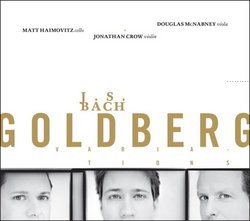| All Artists: Matt Haimovitz, Douglas McNabney, Jonathan Crow Title: Goldberg Variations Members Wishing: 0 Total Copies: 0 Label: Oxingale Records Original Release Date: 1/1/2008 Re-Release Date: 9/16/2008 Genre: Classical Styles: Chamber Music, Historical Periods, Baroque (c.1600-1750), Classical (c.1770-1830) Number of Discs: 1 SwapaCD Credits: 1 UPC: 800658201428 |
Search - Matt Haimovitz, Douglas McNabney, Jonathan Crow :: Goldberg Variations
 | Matt Haimovitz, Douglas McNabney, Jonathan Crow Goldberg Variations Genre: Classical
Widely popularized by Glenn Gould's recording of 1955, J. S. Bach s monumental Goldberg Variations has become a musical shrine where transcriptions are offered for almost any instrument or combination, from solo guitar to ... more » |
Larger Image |

 Track Listings (32) - Disc #1
Track Listings (32) - Disc #1